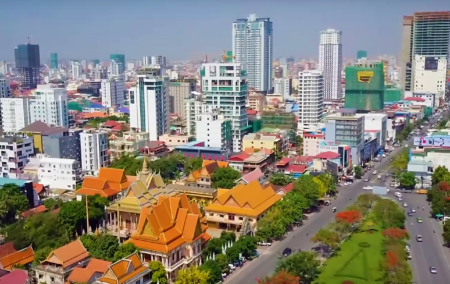Recently I was lucky enough to travel to Cambodia in Asia. While there I learnt about a man called Pol Pot and his political party, the Khmer Rouge.
I initially thought Khmer Rouge was a local type of lipstick and I was looking forward to trying it out, but it turns out it was far more than a South-East Asian cosmetic.
Pol Pot and the Khmer Rouge divide opinions somewhat. Among liberals and corporate shills the Khmer Rouge are remembered for the quarter of the Cambodian population that died in the four years they governed the quaint little country. But among those who have a more nuanced view of these things (such as myself and my fellow members of the Bryanston branch of the EFF) it is clear that the Khmer Rouge do not get the credit they deserve for reducing inequality so quickly or for getting people to return to the land.
They were so committed to equality that people were shot if they ate more than others. Eating an apple that had fallen from a tree was a capital offence. Of course, that’s a bit of an overreaction in my opinion, but sometimes one must take serious measures to reduce inequality. Shooting people who have more is perhaps overkill but it could be something we should consider in reducing our high rates of inequality, instead of neo-liberal concepts like ‘economic growth’ or similar.
They were also pioneers in decolonisation, cutting out all foreign influences. The Khmer Rouge believed that creating a hermit state would lead to economic self-sufficiency and realise Cambodia’s industrial potential (seeing any similarities yet, dear reader?). They did probably go a bit too far by killing anyone who could speak a foreign language, had been educated abroad, or who had foreign connections. Something which does make me see Pol Pot in a slightly negative light is that he spoke French and had been educated in Paris, so it is strange that his own organization did not have him killed. As we know, few self-described revolutionaries are hypocritical, so such behaviour by Pol Pot is puzzling.
Furthermore, they abolished private property, along with other alienating and bourgeois concepts, such as money.
During my visit to Cambodia I was quite disappointed to find that many of Khmer Rouge’s innovations were abandoned when Pol Pot and his band of merry non-binary people were overthrown. Citizens were allowed to return to the cities, and foreign influences are now quite strong in places like the capital Phnom Penh, or cities like Siem Reap. Private property has already made something of a comeback, it appears, with communal living seemingly being quite unfashionable.
As we know, inequality is one of the most pressing issues in South Africa. Reactionary apologists will tell you that inequality is simply a symptom of unemployment, which they will in turn blame on the government rather than the neo-apartheid, white companies which continue to control our economy.
It is true that Cambodian incomes plummeted during the time the Khmer Rouge was in power but this is a small price to pay to see a decline in inequality and the abolition of white bourgeois concepts such as wealth and private property.
It is also true that the Khmer Rouge were often described as a bunch of totalitarian communist thugs and gangsters, but we would do well to not always believe what those in the media, with a vested interest in the status quo, want us to think. For example, we are often told that the Soviet gulags were awful places, but new research from young socialists on Twitter indicate that the gulags actually weren’t that bad. Conjugal visits were allowed, for example, and the inmates were paid good wages, while also having access to learning materials.
I, for one, wouldn’t be surprised if stories about Tuol Sleng prison in Phnom Penh have been exaggerated by Western historians who are little better than shills for big money.
But can we as South Africans learn anything from Pol Pot and his Khmer Rouge?
I daresay we can.
Their stance on free speech and safe spaces was something we can learn from, for example. People refrained from saying anything that could offend others (especially members of the Khmer Rouge) on pain of death. This may seem harsh but surely people are more comfortable in an environment where they know nobody will say anything that may upset them?
As we know, despite surveys pretending otherwise, land is the most pressing issue in the country today. A return to the land, as envisioned by our own Khmer Rouge franchise, would see the real potential of the country unlocked.
We know that this will be difficult. Recalcitrant whites refuse to share wealth which all South Africans are entitled to. And people may point to Zimbabwe and the mistakes made there, but we know it will be different here.
And the day may be closer than we think. The news that the government is planning to finally smash white privilege by accelerating expropriation without compensation and black economic empowerment must be welcomed. I unfortunately will not be here to see our country finally become a sunlit upland, as I am moving to Sydney soon (my visa came through last week – yay me!).
The Khmer Rouge tried to do what we are embarking on – let’s not stuff it up like Mr Pot and his friends did.
The views of the writer are not necessarily the views of the Daily Friend or the IRR
If you like what you have just read, become a Friend of the IRR if you aren’t already one by SMSing your name to 32823 or clicking here. Each SMS costs R1. Terms & Conditions Apply.

